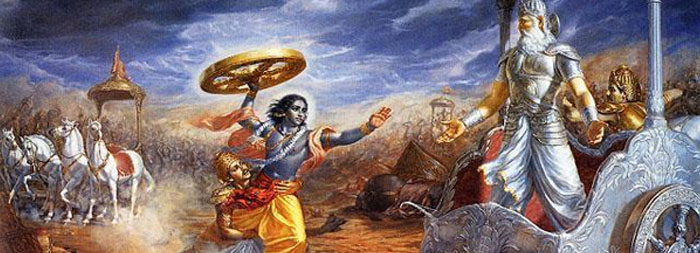Am I really talking about “ Dharma”? The archaic word found in Indian scriptures, with an ambiguous meaning?
This is not an intention to explain but to ignite thought on the relevance of an ancient, powerful concept in the area of Corporate Leadership.
The new challenges of leadership have seen multiple complexities, and leaders failing despite their best efforts. Enron, Satyam, and many more where facades tumbled, deceit and willful corruption was exposed and shallow decision making resulted in innumerable career casualties and loss of investor wealth.
Leadership/Talent Development has been running with the new challenges, bringing in new solutions and skills to arm the leaders, and the struggle continues.
So, in this effort to build a future race of leaders, and evolution of new paradigms, attitude and skills, would the ancient concept of “Dharma” move to a more central role?
Firstly, what is Dharma ? Dharma has been mentioned frequently in the Vedas and Upanishads, but the Mahabharata is the most detailed exposition of the concept, showing its myriad colors and yet, refusing to give one definition of the same. Its repeatedly been termed as “subtle” and various characters give differing explanations. What is surely emphasized is the critical importance of a person to follow his or her Dharma, which would eventually lead to the good of the world and personal happiness.
Though subsequently Buddhism and other experts have tried to “define” it, one tends to go back to the Mahabharata, which truly and humbly reveals the subtlety of Dharma through the rich dialogue of people in the midst of emotions and war.
Literally, Dharma means to “sustain” and denotes the righteous action (thought, word and deed) by a person which would sustain himself, his family and society. But then what is righteous action? Is it common for all, or specific to a society or even each individual?
And then, what is the benefit of following Righteous action ? In today’s world, where concepts like Heaven and Hell have been mythologized by science, what is the true value of such a path?
Even the concept of the larger good (“Consequentialism”), where you sacrifice the individual for society, does not truly explain Dharma.
In my amateurish attempt to unravel the meaning of Dharma and connect to present leadership context, a few areas that seem to emerge as important for leaders could be as follows :
1. I Connect with my inner voice: This is essentially from the postulate that Dharma for each individual is unique. But then, is there an inner voice? Maybe what we call as Conscience or Intuition. Seems there is an inner compass, usually drowned in our mental noise, which can guide us on the best path and decision to take in a situation. Leaders may need to put more effort into self absorption, meditation and building intuition to let this inner voice emerge. Perceived truth always comes in shades of grey and if the inner voice is strong, it could cut through the confusion like a light house on a dark foggy night.
2. I hold Compassion in every situation : One definition of Dharma is that “we do not do to others, what we find repugnant for ourselves”. So compassion for every living being is a powerful intention. But then what does a butcher do, whose livelihood depends on killing animals? Honestly, I do not have the answer! Maybe the compassion is within the boundaries of one’s duty. Again, the perspective on repugnance is very individualistic. If a CEO truly believes that he should be sacked if he does not deliver, he is within his Dharma for summarily sacking a non performer. Overall, compassion can be shown in any circumstances, within any boundaries or constraints, but this sensibility can truly be exhibited by the virtue of Integrity
3. My action is consistent with my intention: Integrity is being consistent in thought, word, deed and Intention. Intention is critical to be genuine and show compassion where it matters. When the inner voice is in conflict with a decision you are being forced to take, its important to raise your voice and manage the conflict effectively. Sometimes, it may impact employees, but for the larger good of the organization.If your boss is cracking a joke and you have to laugh, rather build a positive intention, instead of faking it. People can see through lack of integrity, and for leaders who have to “walk the talk”, it could make all the difference in the trust within the organization. Integrity also brings in a clarity on what is “Compassion” for an individual and how he/she takes decisions.
4. What am I here for ? : Its believed that every human comes to earth for a purpose, which has also loosely been called his “Dharma”. If he/she does not recognize and work on that purpose before dying, the individual’s Dharma is diluted. But what is our life purpose and how do we find it? Maybe the inner voice can help. Our purpose is something which resonates with us and makes us feel fulfilled and happy. But its not handed to us on a plate or branded on our foreheads. Some people are lucky to move into that space and excel, while many die before realizing it. Self awareness seems the only way to cut through our mental projections, ego compulsions and paradigms to recognize our talent and grab opportunities to use it for larger good of society.
5.I focus on the action, rather than the result : This is a tricky point.“Nishkaam karma” has never been accepted as practical in worldly situations. Were the Nazi officers correct in killing thousands of Jews, as they had been commanded? Wasn’t that Nishkaam karma? Where do you disconnect from the purpose of the action, and start focusing on the action itself? But there is a wisdom in Nishkaam karma, which helps diminish fears, anxiety and concern about opinion of others. In moments of doubt and resistance, Leaders may have to doggedly pursue action for the good of the organization and society. Also, a focus on action could help diminish envy, need of recognition and other such issues that can cause a leader to deviate.
“ Righteousness” or Dharma has not yet entered the lexicon of leadership skills in the modern world. Who would a Righteous leader identify with? Yudhistra, the model of Dharma who lost his wife in a game of dice and later wrung his hands as he reluctantly entered into war with the Kauravas? Or it would be Krishna, who despite being a God, used trickery and illusions to kill all the stalwarts among the enemy, yet insisting it was part of his Dharma?
I love the story depicted in the picture attached, where Krishna in a rare moment of fury, instigated by Bishma, is ready to transgress his Dharma and attack him.
The last word on Dharma is with Yudhistra, ( the embodiment of Dharma) who was asked “What is Dharma?” by the Yaksha and was under pressure to give the best reply to get back the life of his brothers. He said that the answer is “in a cave” ….which might mean its truly within us and unique to each individual.
“Righteous “ behavior might be a powerful paradigm and/or skill for helping leaders to navigate through the complex situations of the modern world. I am sure Learning & Development experts would decipher the value of this concept and imbibe it for building a superior leadership in the future.
Any comments or thoughts are welcome !





Post a comment